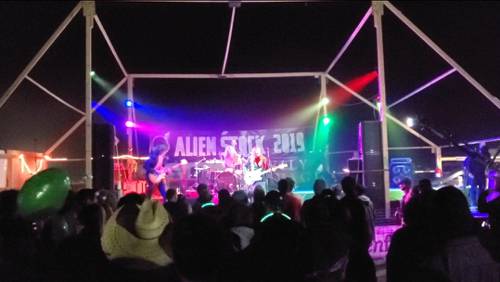
FAQ About The Role of Music Festivals in Shaping Youth Culture

What impact do music festivals have on youth culture?
Music festivals significantly impact youth culture by providing a space for young people to explore new identities, engage in cultural exchange, and celebrate artistic expression. These events often become melting pots of various cultural trends and can influence fashion, music, and social movements that resonate with younger audiences.

How do music festivals foster community among young people?
Music festivals foster community among young people by bringing together individuals with shared interests in music and art. They create an environment where attendees can connect, share experiences, and collaborate. The collective experience of enjoying live performances enhances a sense of belonging and community among participants.

In what ways do music festivals influence new music trends?
Music festivals are often platforms for emerging artists and genres. They provide exposure to diverse music styles and can accelerate the popularity of new trends by showcasing innovative performances. Festivals also serve as venues where artists can experiment with their music, leading to the evolution of mainstream musical tastes.

Can attending music festivals help young people develop a sense of identity?
Yes, attending music festivals can help young people develop a sense of identity. These events often encourage self-expression through music, fashion, and art, allowing individuals to explore different aspects of their personalities and connect with like-minded peers. This exploration can contribute significantly to personal growth and the formation of a distinct identity.

Are there any social movements associated with music festivals?
Music festivals have historically been associated with various social movements. For example, the counterculture movement of the 1960s was significantly influenced by events like Woodstock. Modern festivals often promote messages of environmental sustainability, social justice, and inclusivity, reflecting the evolving priorities of younger generations.

What role do music festivals play in global cultural exchange?
Music festivals play a crucial role in global cultural exchange by bringing together artists and audiences from diverse backgrounds. These festivals offer a platform for cross-cultural interaction, allowing attendees to experience different cultures and musical styles. This interaction fosters mutual understanding and appreciation of global diversity.

How do fashion trends at music festivals influence youth culture?
Fashion trends at music festivals often influence youth culture by showcasing eclectic and innovative styles that attendees later adopt in their daily lives. The festival environment encourages bold fashion choices, which can popularize certain looks and inspire broader fashion movements within youth culture.

What are some examples of music festivals that have shaped youth culture?
Examples of music festivals that have significantly shaped youth culture include Woodstock, Coachella, Glastonbury, and Burning Man. These festivals have not only been cultural landmarks due to their musical offerings but also because of their roles in influencing fashion, lifestyle, and social norms among young people.

How does the music festival experience differ from regular concerts?
The music festival experience differs from regular concerts in several ways. Festivals often span multiple days and feature a wide array of performances across various genres, creating a more immersive environment. They also incorporate other cultural elements such as art installations, workshops, and interactive activities, offering a more comprehensive cultural experience.

How can music festivals benefit young artists?
Music festivals provide young artists with the opportunity to perform before large audiences, gain industry exposure, and network with other musicians and industry professionals. This exposure can lead to increased recognition, career opportunities, and the chance to influence contemporary music trends.

What are the environmental impacts of music festivals, and how do they address them?
Music festivals can have significant environmental impacts, such as waste generation and carbon emissions. To address these issues, many festivals implement sustainable practices, such as recycling programs, renewable energy sources, and public transportation options. Some also promote environmental awareness among attendees as part of their programming.

Are virtual music festivals a viable alternative to traditional ones in shaping youth culture?
Virtual music festivals have emerged as a viable alternative to traditional events, especially during unprecedented times like the COVID-19 pandemic. They allow broader access to diverse audiences and can continue to influence youth culture by embracing technology to create immersive digital experiences. However, they lack the tangible social interactions and communal atmosphere of physical festivals.

How do music festivals promote inclusivity and diversity?
Music festivals promote inclusivity and diversity by featuring a wide range of performers from various cultural and musical backgrounds. They often embrace themes of acceptance and equality, ensuring that the festival environment is welcoming to all attendees, regardless of their race, gender, or sexual orientation.

What risks are associated with attending music festivals, and how can they be mitigated?
Attending music festivals can involve risks such as overexposure to sun, dehydration, and overcrowding, as well as personal safety concerns. To mitigate these risks, festival organizers often provide medical services on-site, ensure adequate facilities, and promote safety awareness among attendees. Participants are encouraged to stay hydrated, apply sunscreen, and keep personal belongings secure.

How do music festivals contribute to local economies?
Music festivals contribute to local economies by attracting visitors who spend money on accommodation, food, and transportation. They create temporary employment opportunities and can boost the profile of the host location. This influx of participants and activities can lead to significant economic benefits for local businesses and communities.

Why are music festivals particularly appealing to young people?
Music festivals appeal to young people because they offer a vibrant and dynamic environment where attendees can enjoy live music, connect with peers, and express themselves freely. The eclectic atmosphere, coupled with the opportunity to experience diverse performances and cultural expressions, makes these events particularly attractive to the youth.

Can music festivals influence political views among young attendees?
Music festivals can indeed influence political views among young attendees, particularly when they feature artists or themes related to social and political issues. Many festivals incorporate workshops, panels, or activist groups that raise awareness about various causes, potentially shaping the political perspectives of their younger audiences.

How have music festivals evolved over the years?
Music festivals have evolved from small gatherings focused on musical performances to large-scale events that incorporate multiple facets of art, culture, and technology. Over the years, they have embraced digital innovations, expanded their lineups to include diverse genres, and increasingly focus on sustainability and inclusivity.

What challenges do music festival organizers face today?
Music festival organizers face numerous challenges, including securing funding, ensuring artist availability, and providing a safe, enjoyable experience for attendees. They must address logistics such as site management and crowd control, while also meeting environmental standards and adapting to changing technology and audience expectations.

How can one prepare for attending a music festival?
Preparing for a music festival involves several steps: securing tickets, planning transportation and accommodation, and packing essentials like sunscreen, water bottles, and suitable clothing. Attendees should also familiarize themselves with the festival lineup and schedule, plan their daily itinerary, and be mindful of festival policies and safety guidelines.
